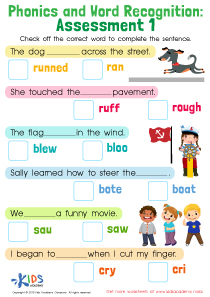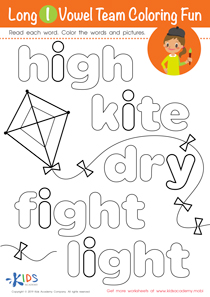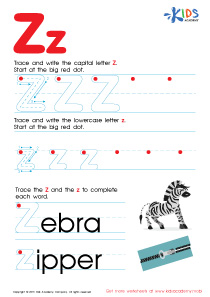Foundational Reading Lessons | Syllables and Rhyming, Kindergarten
3 results
Introduce your kindergarteners to the world of language with our engaging Syllables and Rhyming Lessons. These interactive worksheets, educational videos, and quizzes are specifically designed to help your little ones develop their linguistic skills. Help them understand the concept of syllables and how to break words down into smaller parts. Our lessons on rhyming will also teach them how to identify patterns and create their own rhymes. With fun and creative examples, our syllables and rhyming lessons will help in the overall development of your child’s vocabulary and reading skills. Let’s empower your child to become a confident communicator with our innovative teaching techniques.
Syllables and Rhyming Lessons: Helping Kindergarten Children in their Studies
Learning in Kindergarten is a crucial stage in a child's education, as this is where they get to build their foundation for future academic success. In this regard, it is important to ensure that the lessons provided to them are engaging, interactive, and helpful to support their learning.
One of the important aspects of learning in Kindergarten is the ability to understand syllables and rhyming. These concepts might seem trivial or overly simple, but solidifying these foundations can eventually lead to better reading, writing, and communication skills in the future.
Syllables and rhyming lessons are best presented in an interactive and playful manner, which can keep students engaged and motivated to learn. "Hands-on" activities such as interactive worksheets and quizzes can help students understand the concept of syllables and rhyming better.
For example, with "Silly syllable sorting," Kindergarten students can categorize picture cards based on their syllable count, which makes it more interactive and interesting for them. They can also practice phonetic awareness with "Rhyme Time" worksheets, where they can identify which words rhyme or create their own rhyming words.
Educational videos can also enhance the learning experience of Kindergarten students. Through visually appealing videos, children can learn about the concept of syllables and rhyming in an entertaining way. Teachers can use videos as a part of their lesson plan or assign them as homework to reinforce the lesson.
Subsequently, quizzes and assessments can aid teachers in identifying the areas where children are struggling with, analyzing the overall progress of the class, and adjusting the learning plan accordingly. These quizzes can be playful, interactive, and rewarding in nature, which would motivate the children to do better. For instance, “Rhyming Riddles” quizzes or “Syllable Hunt” activities that have awards for correct answers can reinforce the lesson more effectively.
Moreover, the importance of syllables and rhyming is often undervalued for young children, but they have significant benefits for their future academic progress. With a solid foundation in these two concepts, they can eventually improve their writing, reading, and comprehension skills significantly. Additionally, an outstanding understanding of these two subjects can lead to better communication skills, critical thinking, and problem-solving abilities that can help them excel in their academic and day-to-day life.















